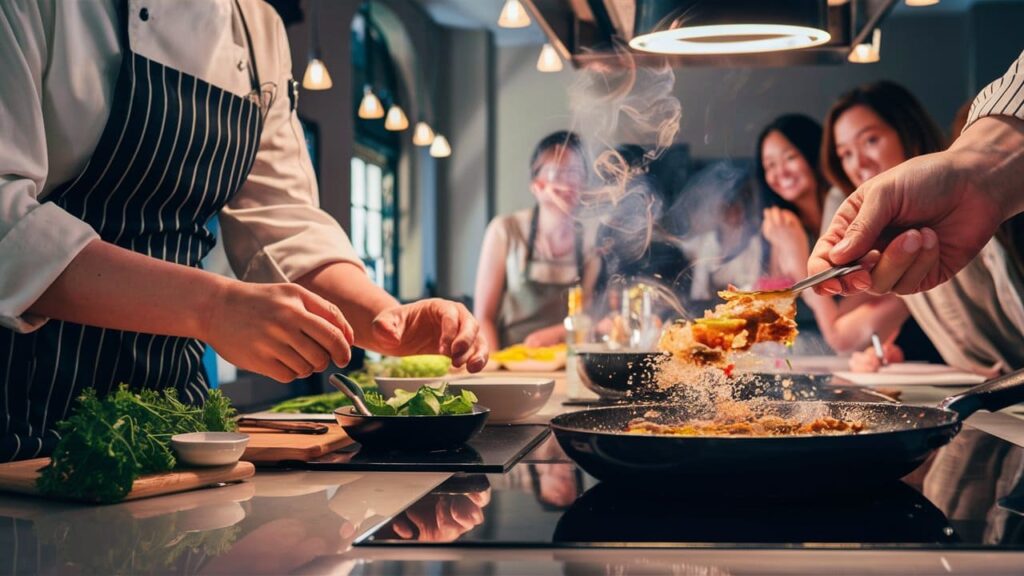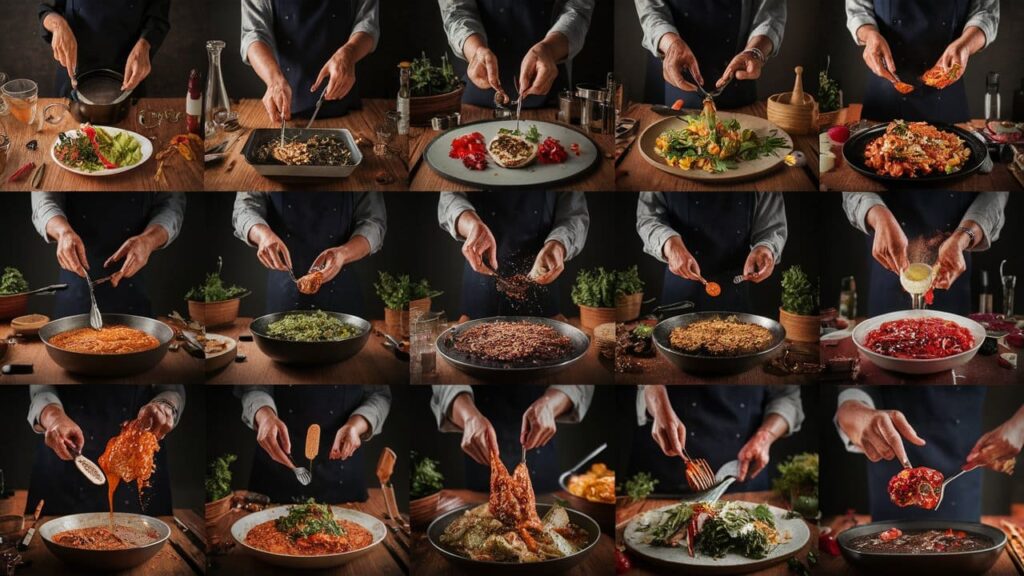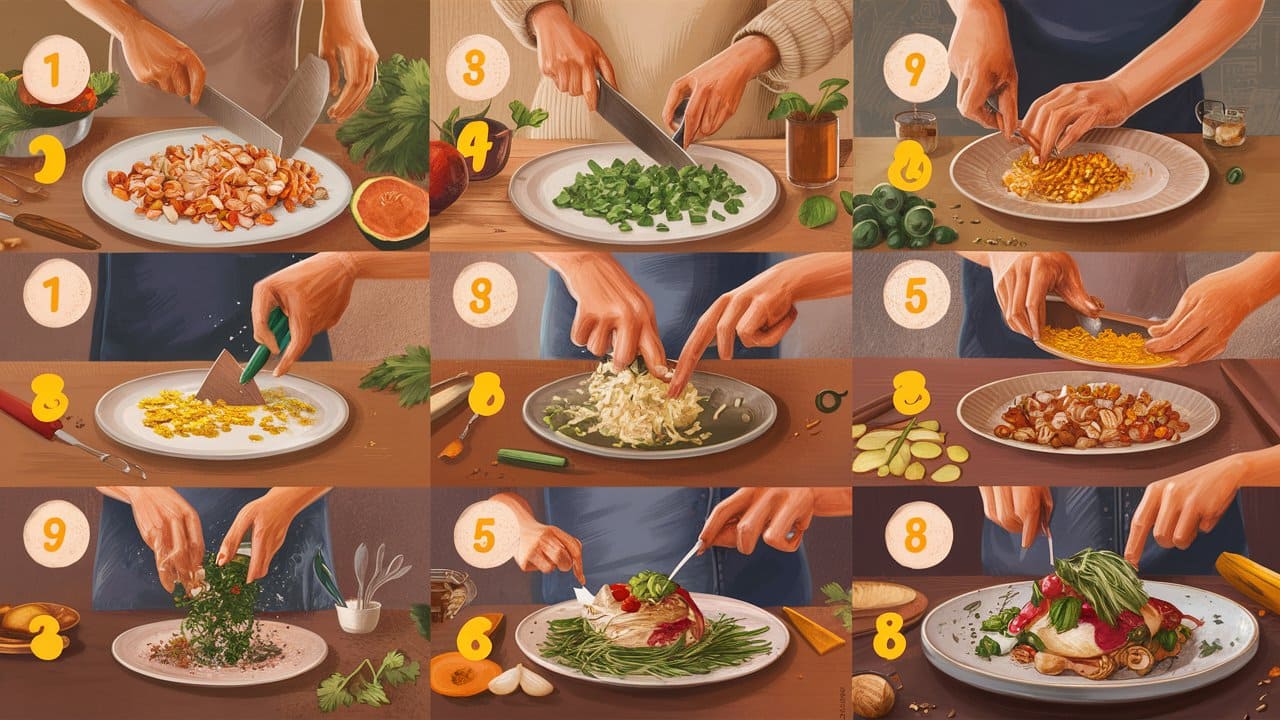Learning to cook well is a valuable skill that enhances not just your daily life but also enriches your social interactions and personal satisfaction. Whether you’re a beginner looking to learn the basics or an experienced cook aiming to refine your skills, this guide provides structured insights into mastering the culinary arts.
Understanding the Basics of Cooking
Learning Essential Cooking Techniques
Before diving into complex recipes, it’s crucial to understand fundamental cooking techniques. Mastering skills such as sautéing, boiling, grilling, and baking forms the foundation of all culinary practices. Start by practicing these techniques with simple recipes that require minimal ingredients.
Using the Right Tools
Equipping your kitchen with the essential tools is a step towards successful cooking. Key items include sharp knives, a sturdy cutting board, a range of pots and pans, and various spoons and spatulas. Investing in high-quality kitchen tools can significantly enhance your cooking efficiency and enjoyment.
Reading and Understanding Recipes
Recipes are guidelines that help you achieve consistent culinary results. Learning to read and understand cook recipes involves knowing culinary terms and following instructions precisely. Start with straightforward recipes with clear instructions before progressing to more complex dishes.
Developing Advanced Cooking Skills
Experimenting with Flavors
A great cook knows how to balance and enhance flavors. Experiment with different herbs, spices, and seasonings to understand their impact on food. Learning how to season properly can transform your cooking from good to exceptional.
Mastering the Art of Timing
Cooking is often about timing. Understanding how to synchronize the preparation and cooking times of different dishes ensures that all elements of your meal are ready at the same time. Practice makes perfect, so use timers and keep notes to refine your timing skills.
Cooking for Dietary Needs
As you advance your cooking skills, learning to cook for various dietary restrictions and preferences becomes important. Whether it’s gluten-free, vegan, or low-calorie dishes, being able to adapt recipes to meet different dietary needs is a valuable skill for any cook.

Practical Tips for Everyday Cooking
Planning and Organizing Meals
Good cooking starts with effective meal planning and organization. Plan your meals for the week, considering the time you have available and the ingredients you need. This not only saves time and reduces stress but also helps with budgeting and reduces food waste.
Practice Makes Perfect
The more you cook, the better you become. Set a goal to cook a new recipe each week or to master a particular technique each month. Regular practice will help solidify your skills and increase your confidence in the kitchen.
Keeping a Cooking Journal
Maintain a cooking journal to record recipes you’ve tried, tweaks you’ve made, and what you’ve learned from each experience. This can be a valuable resource for tracking your progress and remembering successful modifications you’ve made to dishes.
Learning cook from Mistakes in the Kitchen
Embracing Errors as Learning Opportunities
Cooking mistakes are inevitable, but they are also invaluable learning opportunities. Whether it’s over-seasoning, under-cooking, or misjudging flavors, each error provides insight into what can be done differently next time. Analyze what went wrong and document it in your cooking journal to avoid repeating the same mistakes.
Adjusting Recipes to Taste
Not every recipe will work perfectly on the first try, and sometimes adjustments are necessary to tailor a dish to your taste preferences. Learn to trust your instincts—taste as you go and adjust seasonings or textures to suit your palate. This flexibility is crucial in developing your culinary intuition.
Seeking Feedback Constructively
Use feedback from family and friends to improve your cooking. Constructive criticism can help refine your techniques and flavors. Be open to suggestions and consider them when preparing meals in the future.
The Benefits of Collaborative Cooking
Cooking with Family and Friends
Cooking with others not only makes the process more enjoyable but also allows you to share knowledge and learn new skills. Whether it’s a family member with traditional recipes or a friend with a different culinary background, each person can bring something unique to the table.
Participating in Cooking Classes
Joining a cooking class can be a fun way to improve your skills and meet like-minded food enthusiasts. Many community centers, culinary schools, and even some restaurants offer classes that cater to a variety of cooking levels and interests.
Online Cooking Communities
Become part of online cooking forums, social media groups, or follow cooking blogs to stay connected with the cooking community. These platforms are great for exchanging recipes, techniques, and personal experiences with others passionate about cooking.
Staying Inspired and Challenging Yourself
Exploring International Cuisines
One of the best ways to improve your cooking and keep it exciting is by exploring international cuisines. Each cuisine offers unique ingredients, techniques, and flavor profiles, expanding your culinary repertoire and challenging your cooking skills.
Keeping Up with Culinary Trends
Stay updated with the latest culinary trends through magazines, cooking shows, and online content. Trends can offer inspiration and introduce new concepts, techniques, and ingredients that you can experiment with in your own kitchen.
Setting Culinary Goals
Set specific goals for yourself, whether it’s mastering a complex dish, learning a new cook style, or cooking through a particular cookbook. Goals keep you motivated and focused on improving your skills continuously.

Continuously Advancing Your Cooking Skills
In the journey to become an excellent cook, continuous learning and adaptation are crucial. Here’s how you can keep advancing your cooking skills and maintain a fresh and exciting approach to culinary arts.
Embracing New Cooking Technologies
Keeping Up with Modern Tools
As technology evolves, so do kitchen gadgets and appliances that can make cooking simpler and more efficient. Experiment with tools like sous vide cookers, pressure cookers, or advanced blenders to expand your cooking techniques and improve your dishes’ quality and consistency.
Exploring Molecular Gastronomy
For those looking to push the boundaries of traditional cooking, molecular gastronomy offers a blend of science and cooking. It allows you to experiment with textures, forms, and flavors, creating unique dining experiences that can challenge and delight your senses.
Advanced Recipe Development
Creating Your Own Recipes
Once you have mastered certain techniques and understand how flavors combine, start creating your own recipes. This can be a deeply rewarding aspect of cooking as it allows you to express your creativity and tailor dishes to your exact preferences.
Hosting Tasting Parties
Organize tasting parties with friends or family where you can showcase your new recipes. This not only makes for a fun and engaging event but also provides you with direct feedback to help refine your dishes further.
Continuous Learning
Reading Culinary Books and Magazines
Keep your knowledge current and your inspiration fresh by reading culinary books and magazines. They can offer new recipes, techniques, and perspectives from top chefs and food writers.
Attending Workshops and Food Expos
Participate in workshops and attend food expos to stay connected with the culinary community. These events are great opportunities to learn from professional chefs and sample a variety of foods.
The Importance of Presentation and Aesthetics
Understanding that presentation enhances the overall dining experience is crucial. Here’s how to improve the visual appeal of your dishes:
Learning Plating Techniques
Study Professional Plating
Watch tutorials or attend classes that focus on plating techniques. Learning how to present food attractively can transform how your dishes are perceived and enjoyed.
Practice Regularly
Practice plating techniques regularly. Try arranging food using different plates, experimenting with color contrasts, and using garnishes not only to enhance the dish’s flavor but also its appearance.
Photography and Sharing
Document Your Dishes
Take photographs of your dishes to document your progress and share them on social media or cooking blogs. This not only builds your cooking portfolio but also connects you with a larger community of food enthusiasts.
Feedback and Improvement
Use the feedback from your audience to improve your cooking and presentation skills. Engaging with fellow food lovers can provide new ideas and motivation to keep improving.
Conclusion: The Journey of a Home Chef
Becoming skilled at cooking is a continuous journey filled with challenges, learning, and immense satisfaction. By embracing both the science and art of cooking, continuously seeking knowledge, and engaging with the community, you can enhance your skills and enjoy the process of becoming a great cook. Remember, good cooking isn’t just about the food—it’s about the passion, creativity, and love that you bring to the kitchen every day. Whether you are preparing a meal for yourself, your family, or guests, each dish offers an opportunity to express yourself and spread joy through delicious, nourishing meals.
You can get more recipes from here:

